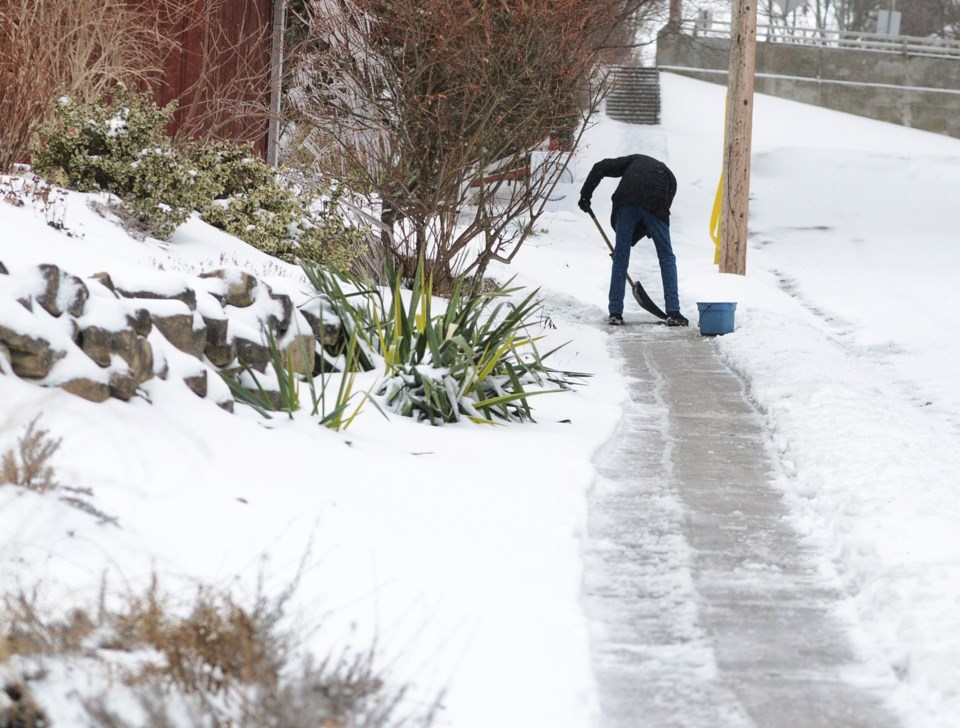Relief for anyone who needs help removing snow from city sidewalks could be in place by next winter now that council has approved a motion that asks staff to report back with options and costs as early as this spring.
Coun. Scott Hamilton presented his motion Tuesday, asking the city to consider amending its snow removal program for seniors and special needs groups, which has been in place since 2005.
Funding provided by the city to Community Support Connections already assists those who need help clearing their sidewalks within the 36-hour window required by city bylaw, but the amount the non-profit agency gets hasn’t increased for more than 15 years.
The city's population, however has grown from 110,000 in 2005 to 138,000 in 2021. And its residents are aging.
Hamilton said snow removal was one of the first issues he heard about after he was elected to council in 2020.
“It seemed like something that could be improved upon,” he told council.
Community Support Connections gets $10,000 annually from the city for a program that matches “volunteer snow buddies” to seniors and people with special needs who need the service and qualify.
Hamilton said he was told about 25 snow buddies help more than 200 people now, with interest in the program growing since his notice of motion was tabled last month.
“We’re not talking about thousands of people out there. We’re just talking hundreds that would need the help,” Hamilton said, adding it would be a “small cost to the taxpayer” to add funding to the program.
“We’re talking cents, not dollars,” he said in reference to the potential tax increase.
Another option to consider is Kitchener’s city-funded-and-administered pilot project, which currently helps up to 250 seniors with free snow removal.
Eligibility for the program is based on age, physical and mental ability to clear snow themselves, and a household income under $46,000, which determines ability to pay market price for the service.
The city then acts as a middle person to make the connection between residents and service providers, Hamilton said.
Coun. Mike Mann likes the idea of growing the support program, but said he wants more thought put into how to help residents whose properties have sidewalks with small boulevards next to the street.
Residents in this situation deal with the problem of having to clear those sidewalks several times because plows come by and push more snow onto the sidewalk from the travelled portion of the road.
He wants staff to identify neighbourhoods where this happens and come up with options to help alleviate the pressure it puts on residents who have to clear it.
Coun. Mike Devine agreed, calling the 10-inch wide boulevards in some neighbourhoods “absolutely insane.”
He doesn’t think it’s fair to expect adjacent homeowners to clear snow that plows move onto their sidewalks because “there’s nowhere to put it.”
Overall, he called it an important motion to consider as the city’s population ages.
He noted how the largest demographic in the country today is the baby boomer generation and the youngest baby boomer is going to be 60 this year.
“They’re going to need help,” he said.
Coun. Shannon Adshade agreed, saying he strongly supports the motion as a member of the city’s accessibility advisory committee.
A revision of the city’s snow clearing program and bylaw is “something that’s long overdue” he added.
But Coun. Jan Liggett worries about costs for a such a program adding up as the city ages and demand increases.
She wants staff to compare those projected costs with the cost of a city sidewalk clearing program when a report comes back to council.
The City of Guelph is an example of a similarly-sized city where city employees plow all sidewalks at taxpayer expense.
Liggett said it may be more cost effective for Cambridge to consider that option.
Mike Hauser, the city’s director of asset management in the transportation services division, said the city clears 22 per cent of its sidewalk network now, the equivalent of a about 40 km.
Devine said he also wants to know what it would cost for the city to take on the job of plowing every sidewalk in the city even though he suspects it’s “going to be a chunk for the taxpayer.”



